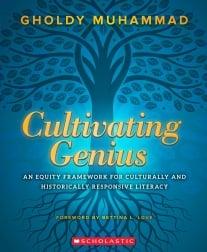Showing posts with label critical thinking. Show all posts
Showing posts with label critical thinking. Show all posts
Teaching Deep Thinking and Emotions
Feb 20, 2020
How does the character feel in this story? How do you know?
These are comprehension questions that we ask our very youngest readers. Many times the answer to the first question is "good" or "bad." And to the second question, students have a difficult time explaining how they know that a character is feeling that way. Reading facial expressions, restating evidence in text, and (in more complex texts) inferring are skills that require prior experience, practice, and (for some) explicit teaching.
To help students think deeply about the characters in the books read, they need the vocabulary to do so. Let's look at one way to do this.
Cultivating Genius
Jan 13, 2020
Scholastic recently asked if I would like to read and review the new book "Cultivating Genius" by Gholdy Muhammad. The back of the book explained that Dr. Muhammad would offer an approach to address the students who have been traditionally "marginalized by learning standards, government policies, and school practices." I knew this was a book for me to dig into.
In her book, Gholdy Muhammad sends out an urgent call to educators for action. We need to make a change or the shift. She says we need to have...
In her book, Gholdy Muhammad sends out an urgent call to educators for action. We need to make a change or the shift. She says we need to have...
Using Jigsaw Puzzles for Critical Thinking
Jul 8, 2015
I had a scary jigsaw puzzle experience this year.
We had a big math event back in the spring where students got to go to different classrooms for a specific math activity. One of the rooms had lots of different jigsaw puzzles. I moved from room to room but found myself spending a lot of time in that room. Many (MANY) of our students had no idea how to solve a puzzle like this.
I watched children trying to fit pieces together that did not remotely look like they would fit together. Straight edges...no concept of what they were for. Strategies...there really weren't any.
It freaked me out, to be honest.
But then I started questioning myself...why do I personally feel that jigsaw puzzles are important? Why do I buy them for my own girls? Why do I download jigsaw puzzle apps for them to play? What do I feel that my students are missing out on?
And what I decided it comes down to for me is problem solving and critical thinking.
Many times when we hear problem solving and we think of math. And YES, I need them to have those skills in math. But problem solving and critical thinking are just as crucial in reading. I see it so often. They come to words that they don't know and they MUST have those problem solving and critical thinking skills to attack and solve that word.
When I witnessed my students not using problems solving or critical thinking skills to put the puzzle together, I started to make some connections in my own brain. Would working on jigsaw puzzles help my students to problem solve and critically think in other areas of learning (like reading)?
Honestly...
I don't know. There is not a lot of research out there. But in my own professional opinion (if that counts), yes, yes it does. Students must come to problems with the confidence and thinking skills to solve it. Puzzles help to cultivate this skill. Students must analyze stories and pay attention to detail when reading. Puzzles help to nurture this skill. The list just continues...
I actually found a post about the 42 Benefits to Jigsaw Puzzles. It was a great post and it confirmed my thoughts.
But now what? I believe that there are transferable skills that come out of jigsaw puzzles and my students don't have these skills. So we work on this. During this upcoming year my school has already decided that we will host a game night once a week. And puzzles will be a BIG part of these nights. Families will have the opportunity to complete puzzles together, take puzzles home, and listen to the benefits of doing these puzzles with their children at home.

So what are your thoughts on the benefits of puzzles? Do you think they can help students be better critical thinkers?
Check out more posts below on ways to help create critical thinkers in your classroom.
Subscribe to:
Posts (Atom)


